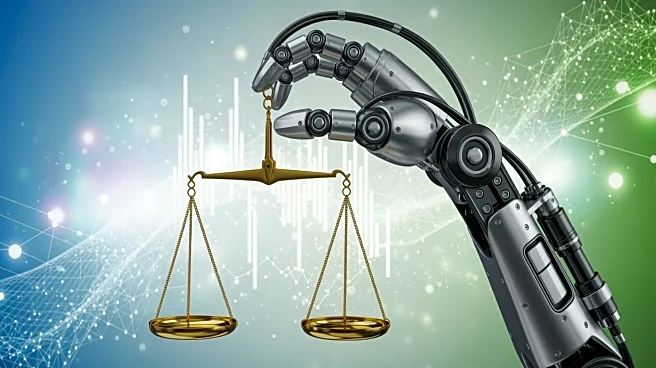What's Happening?
Analysts at Goldman Sachs have identified a trend of 'jobless growth' in the U.S. economy, characterized by robust GDP growth with minimal job creation. This phenomenon is largely attributed to the increasing adoption of artificial intelligence by businesses,
which is expected to drive economic growth without corresponding increases in employment. The memo, authored by economists David Mericle and Pierfrancesco Mei, highlights that while AI is contributing significantly to GDP growth, it is not leading to substantial job creation, particularly in entry-level positions. The analysts note that the labor supply growth is modest due to factors such as population aging and lower immigration rates. Despite the hype surrounding AI, there is limited evidence of widespread job displacement, although the technology is impacting hiring practices, especially for new entrants to the job market.
Why It's Important?
The trend of 'jobless growth' poses significant challenges for the U.S. labor market, particularly for individuals seeking entry-level positions. As businesses increasingly rely on AI, the traditional pathways for career advancement may be disrupted, potentially leading to a shortage of experienced professionals in the future. This could have long-term implications for economic stability and workforce development. The reliance on AI-driven growth also raises concerns about the sustainability of economic expansion, as it may mask underlying vulnerabilities in the labor market. The situation underscores the need for policymakers to address the potential social and economic impacts of AI adoption, ensuring that technological advancements do not exacerbate inequality or hinder job creation.
What's Next?
The full impact of AI on the labor market may not be realized until a recession occurs, according to the economists. As AI-related spending continues to drive GDP growth, there is a risk that the economy could become overleveraged on AI investments, potentially leading to a downturn similar to the 2008 financial crisis. Policymakers and industry leaders may need to consider strategies to balance AI adoption with job creation, ensuring that economic growth is inclusive and sustainable. Additionally, there may be increased scrutiny on the role of AI in the economy, prompting discussions on regulatory measures to mitigate potential risks.
Beyond the Headlines
The shift towards a 'jobless growth' economy raises ethical and cultural questions about the role of technology in society. As AI becomes more integrated into business operations, there is a need to consider the implications for workforce diversity and inclusion. The reliance on AI could exacerbate existing inequalities, particularly for marginalized groups who may face barriers to accessing new opportunities. Furthermore, the cultural impact of AI-driven growth may influence societal values, as traditional notions of work and career progression are challenged by technological advancements.















